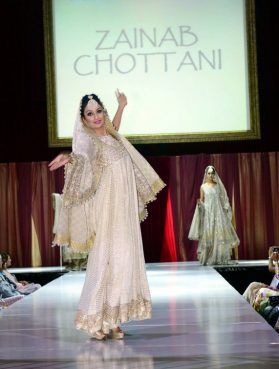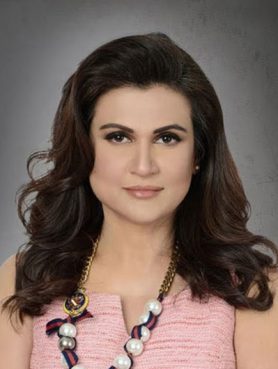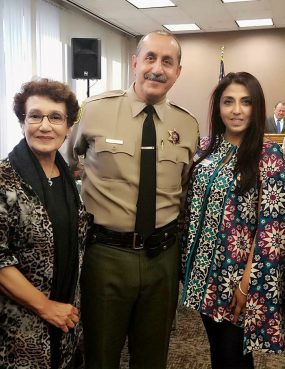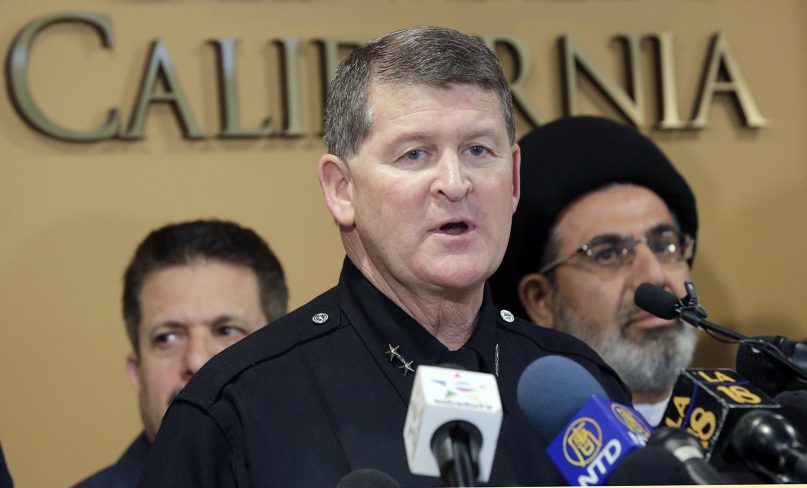LOS ANGELES (RNS) — It’s not every day an LAPD officer gets invited to speak at a fashion show.
But in 2018, Michael P. Downing, then the department’s commanding officer of the counter-terrorism and special operations unit, happily accepted the unexpected role of guest of honor at a swank event focused on South Asian fashion in downtown Los Angeles. Downing knew his presence was important.
It was an opportunity to help reframe some of the discussions in the California Muslim community away from security issues that had fomented distrust, toward a shared goal of public safety.
“Where there was suspicion, we wanted to build better dialogue with law enforcement. I think we have to understand there is not just one Muslim community — that the ummah is very diverse. These interactions have given us a better understanding of that and of the needs of this community,” Downing said.

Sitara Attaie, an advocate of law enforcement careers for Muslim girls and an actor in the show “Homeland,” participates in a 2018 fashion show in Long Beach, California. Photo by FaisalPhotographer.com
Downing was invited to the fashion show by the American Muslim & Multifaith Women’s Empowerment Council, a nonprofit that seeks to empower Muslim women to be a bridge between their community and law-enforcement organizations.
In 2016, at a time when surveillance programs and rising Islamophobia had severely complicated the relationship between Muslim Americans and law enforcement.
“After 9/11, the tensions between Muslim communities and law-enforcement agencies arose over discriminatory observation and other issues,” said Anila Ali, the founder of AMMWEC. “I thought that we in the Muslim community should not be passive and should build bridges with law enforcement over our mutual concern over terrorism. … At the same time, the Muslim community today increasingly faces the challenge of Anti-Muslim discrimination.”
The AMMWEC program is notable among other bridge-building programs in its focus on putting Muslim women at the center of its efforts. With offices on both coasts, AMMWEC is most active in California, where it has connections with local law enforcement organizations as well as national organizations like the FBI.

Anila Ali, founder of AMMWEC. Courtesy photo
“These programs help demystify organizations like the FBI. They become volunteers for public service opportunities and find other recruits,” Ali said.
It has also provided the women job opportunities, while providing law enforcement. So far, at least six women have completed formal law-enforcement internships. Others have taken courses with the FBI and attended FBI programs for civilians. One of the program’s interns went on to take a position with the FBI. Other efforts have involved partnerships with the CIA, according to Ali.
“There is still a stigma in our society and in the Muslim community in particular regarding women who get divorced,” Ali said. “These internships and programs can allow women who have lost access to much of their social network a new career path.”
RELATED: American Jews and Muslim interfaith groups resume efforts after Gaza battles
In some Muslim communities, according to Ali, perceptions about law enforcement have begun to shift, as crime-fighting agencies have turned to countering violent Islamophobia and as the Biden administration has placed increasing emphasis on monitoring far-right extremism. Ali also cited “Quantico,” a popular television show starring Bollywood actress Priyanka Chopra as an FBI special agent, as a factor. The show, she said, helped build the appeal of the bureau within the South Asian community.

Dr. Farhat Zubair, from left, Sergeant Mike Abideen and Faryal Khan participated in past AMMWEC programs. Courtesy photo.
Believing that Muslims have a responsibility to play a leading role in preventing violent extremism, she has also developed new approaches to that work. In 2015 she was invited to speak at the White House Summit for Countering Violent Extremism.
This part of her work has not always been popular with other Muslim NGOS. At least one prominent group has since tried to discourage organizations from inviting her to their events.
But Ali believes it’s important for government agencies to hear Muslim voices, especially those of Muslim women, who are often marginalized in such discussions.
RELATED: Islamophobia on the rise, according to United Nations report
As important to Ali is that those Muslims be ready to speak. Ausna Haris, while still in high school, participated in some of AMMWEC’s early law enforcement programming and is hoping to become a lawyer.
“My perspective on law enforcement certainly changed as a result of this program; we engaged in some scenarios with law enforcement that were pretty heavy, and you had to think on your feet,” said Haris.
“I think there is certainly a lot of valid criticism of law enforcement in certain contexts,” Haris added, “but I think this program definitely opened my eyes regarding opportunities in public service and volunteerism.”





